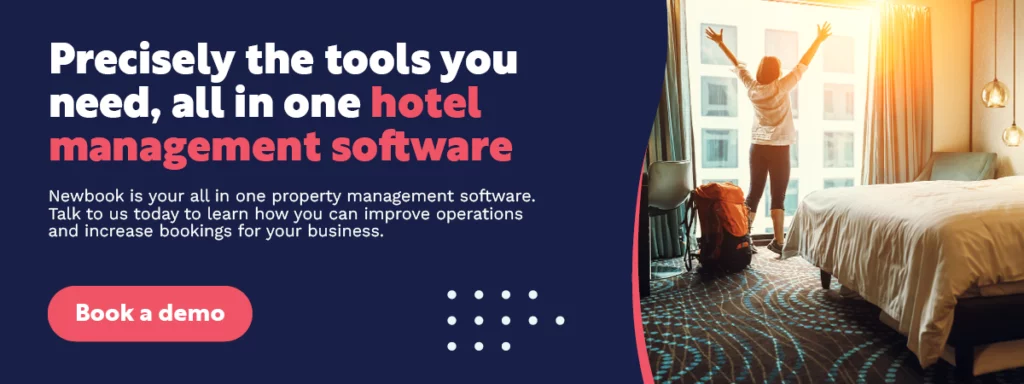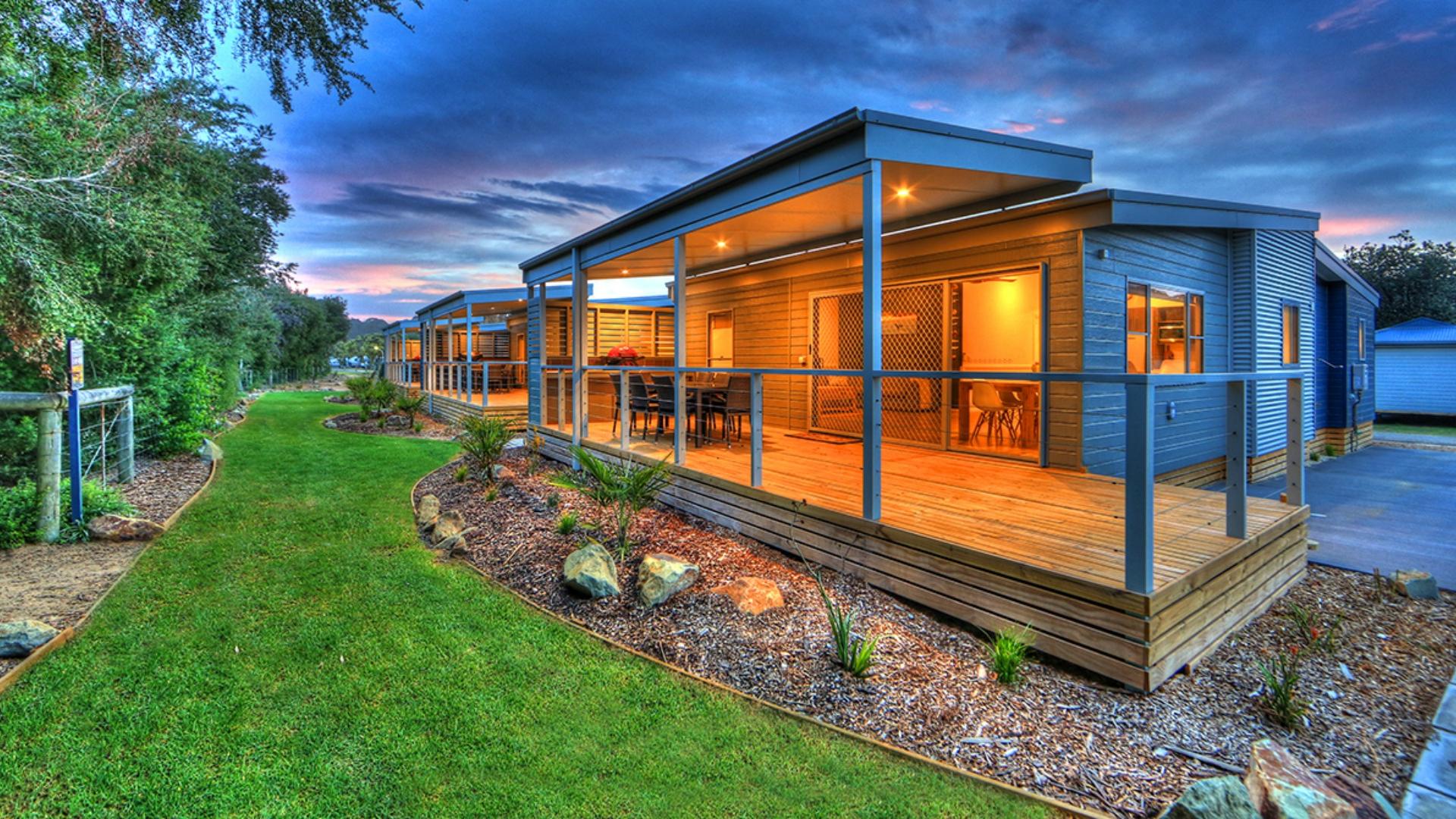Imagine for a moment that you’re one of your customers trying to book a vacation. They’ve already secured their flight, and the next step is choosing accommodations. They land on your business on whatever online travel agency (OTA) they are using (Expedia, Booking.com, you know the ones) and peruse the pictures and prices. They feel satisfied to book with you after checking out some reviews.
At this point, they may just continue on with the OTA and get a single price for everything altogether. Or, they might choose to book directly with you due to the billboard effect (this is a phenomenon that describes how travelers will often visit the website of an accommodation business after seeing it on an OTA). Either way, this is a prime opportunity to take advantage of cross-selling and upselling.
The average traveler not only prefers booking online, but they also want more control over their vacation experience. While it might seem overly salesy to include things like champagne in the room, dinner packages, or kayak rentals in the booking process, it actually gives your potential guest the opportunity to plan their entire experience in one go. Why bother with waiting in lines or tracking staff members to ask questions when you arrive at your destination when you can handle everything online?

This brings us to the difference between cross-selling and upselling: when should you be offering complementary products and services to your guests, and when should you offer them an upgrade?
In this article, we take a closer look at what cross-selling vs upselling means in hospitality, the benefits, the key differences between the two approaches, and how to implement these approaches into your booking process and revenue management system (RMS).
Hospitality Upselling and Cross-Selling Meaning
Hospitality cross-selling and upselling are essential strategies for increasing revenue and enhancing the guest experience in the hospitality industry. The table below provides a quick breakdown of each of these terms:
| Upsell Definition | Cross-sell Definition |
|---|---|
| Upselling involves persuading guests to purchase a higher-priced product or service than what they initially intended. It’s about encouraging guests to upgrade their choices or add premium features to their existing bookings. | Cross-selling involves recommending related or complementary products or services to guests based on their current purchases or interests. It’s about offering additional options that complement the guest’s primary purchase. |
Both cross-selling and upselling strategies require a deep understanding of guest preferences, effective communication techniques, and seamless integration into the booking and guest service processes. When executed thoughtfully and ethically, these strategies can contribute significantly to revenue growth while delivering enhanced value and satisfaction to guests.
Benefits of Cross-Selling and Upselling in Hotels

Cross-selling and upselling offer several benefits to hotels, enhancing both the guest experience and revenue generation. Here are some key advantages:
- Increased revenue: Cross-selling and upselling enable hotels to boost their average revenue per guest by encouraging additional purchases of products, services, or upgrades. By presenting guests with relevant offers tailored to their needs and preferences, hotels can capitalize on opportunities to maximize revenue during the guest’s stay.
- Enhanced guest experience: By offering complementary products or upgrades that align with guests’ preferences and interests, hotels can enhance the overall guest experience. Cross-selling and upselling initiatives that add value and convenience contribute to guest satisfaction and loyalty, leading to positive reviews and repeat bookings.
- Personalization and customization: Cross-selling and upselling allow hotels to deliver personalized recommendations based on guest data and preferences. By leveraging guest profiles, booking history, and CRM data, hotels can tailor offers to meet the unique needs of individual guests, creating a more personalized and customized experience.
- Optimized inventory utilization: Effective cross-selling and upselling strategies help hotels optimize their inventory utilization by promoting the sale of ancillary products, services, or upgrades that may otherwise go underutilized. By maximizing the use of available resources and amenities, hotels can improve operational efficiency and profitability.
- Increased guest engagement: Cross-selling vs upselling initiatives provide opportunities for hotels to engage with guests throughout their stay, fostering positive interactions and relationships. By proactively suggesting relevant offers and enhancements, hotels can demonstrate attentiveness to guests’ needs and preferences, enhancing engagement and satisfaction.
- Competitive advantage: Hotels that excel at cross-selling and upselling differentiate themselves from competitors by offering unique and compelling value propositions. By providing guests with a wide range of options and opportunities to enhance their stay, hotels can position themselves as preferred destinations and capture market share.
- Incremental sales and revenue growth: Cross-selling and upselling initiatives drive incremental sales and revenue growth by encouraging guests to purchase additional products, services, or upgrades beyond their initial booking. By leveraging upselling and cross-selling opportunities at various touchpoints throughout the guest journey, hotels can maximize revenue potential and profitability.
Cross-selling vs Upselling: The Key Differences & Examples in Hotels
We’ve gone through the definition and benefits of Cross-selling vs upselling, but what about actual examples of these two sales techniques in practice? Remember, cross-selling vs upselling involves identifying opportunities to provide guests with additional value and convenience beyond their original booking plans and drive revenue for your accommodation business.
Upselling and Cross-Selling Examples
To recap, upselling is synonymous with an upgrade—so any upsells that are offered to the customer would be a direct upgrade from whatever products or services they already chose during their booking process. Here are some examples of hotel upselling opportunities:
- Room upgrades: Offering guests the option to upgrade to a higher room category, such as a suite or a room with a better view, can be a lucrative upselling opportunity. Upselling room upgrades allows guests to enjoy enhanced comfort, space, and amenities during their stay.
- Early check-in or late check-out: Providing guests with the option to check in earlier than the standard check-in time or check out later than the standard check-out time for an additional fee can be an attractive upselling proposition. This allows guests to enjoy greater flexibility and convenience, especially if they have early arrival or late departure times.
- Enhanced amenities: Upselling enhanced amenities, such as access to a club lounge, spa services, or exclusive recreational facilities, allows guests to indulge in luxury experiences during their stay. Hotels can entice guests to upgrade for a more memorable stay by highlighting the added value and exclusivity of these amenities.
- Food and beverage upgrades: Offering guests the option to upgrade their dining experience with special packages, such as breakfast in bed, a champagne brunch, or a gourmet dinner package, can be an enticing upselling opportunity. Upselling food and beverage upgrades allows guests to enjoy premium dining experiences without leaving the hotel premises.
- Special packages and add-ons: Creating special packages or add-ons tailored to guests’ interests and preferences can be an effective upselling strategy. For example, offering a romantic package with flowers and chocolates for couples celebrating a special occasion or a family fun package with tickets to local attractions can enhance the guest experience and drive additional revenue.
- Transportation services: Providing guests with the option to upgrade their transportation services, such as airport transfers in a luxury vehicle or chauffeur-driven sightseeing tours, can add value to their stay. Upselling transportation services allows guests to enjoy convenience and comfort during their travels.
- Room enhancements: Offering guests the option to enhance their room with amenities such as premium bedding, bathrobes, slippers, luxury toiletries, or in-room entertainment packages can elevate the guest experience. Upselling room enhancements allow guests to customize their stay according to their preferences.
Cross-selling in hotels involves offering guests complementary products or services to enhance their overall experience. Here are some examples of cross-selling in hotels:
- Restaurant reservations: Upon check-in or during the booking process, hotels can offer guests the option to make restaurant reservations at on-site dining establishments. Cross-selling restaurant reservations allow guests to conveniently plan their dining experiences in advance, ensuring availability and enhancing their stay.
- Spa treatments: Hotels with on-site spas can cross-sell spa treatments to guests looking to relax and unwind during their stay. Offering services such as massages, facials, and body treatments allows guests to indulge in pampering experiences without having to leave the hotel premises.
- Tour and activity bookings: Hotels located in tourist destinations can cross-sell tour and activity bookings to guests interested in exploring the area. Offering guided tours, excursions, and recreational activities allows guests to discover local attractions and experiences, enhancing their stay and creating lasting memories.
- Transportation services: Offering transportation services to guests in need of airport transfers or local transportation assistance is a great way to provide additional value to guests. Options such as shuttle services, car rentals, or chauffeur-driven tours allow guests to conveniently navigate their surroundings and explore nearby attractions.
- Concierge services: Hotels can cross-sell concierge services to guests seeking personalized recommendations and assistance during their stay. Offering services such as restaurant reservations, theatre tickets, transportation arrangements, and sightseeing recommendations allows guests to make the most of their time at the destination.
- In-room amenities: Cross-selling in-room amenities to guests looking to enhance their comfort and convenience is a great way to boost revenue. Offering options such as minibar packages, snack baskets, premium bedding, or entertainment upgrades allows guests to customize their stay according to their preferences.
- Gift shop purchases: Hotels with on-site gift shops can cross-sell retail merchandise to guests interested in souvenirs or gifts. Offering items such as branded merchandise, local artisan products, or specialty items allows guests to take home mementos of their stay and support local businesses.
- Event tickets: Hotels can cross-sell event tickets to guests interested in attending concerts, shows, or sporting events in the area. Partnering with local venues and attractions to offer tickets to popular events allows guests to enjoy entertainment options during their stay.
The Role of Technology in Upselling and Cross-Selling
Technology plays a crucial role in facilitating upselling and cross-selling efforts in hotels, enhancing the guest experience, and increasing revenue. Here’s how technology is leveraged for these purposes:
1. A Robust Online Booking Engine
To accommodate direct bookings and encourage guests to see the process through to the end (without bouncing and going to an OTA instead) you need an effective online booking system. With Newbook, for example, you can have a big ol’ booking button right on your website, and the interface within the booking engine itself can be branded with your business’s colors and fonts so potential guests won’t feel like they’ve been jettisoned onto a different website once they click that button.
From there, you can customize the booking experience through interactive maps (really useful for campground and RV parks where guests will want to select a site based on view, proximity to amenities, or size) and, of course, incorporate cross-sells like adding on a bottle of wine in the room, a romantic dinner for two, or a bicycle rental. At this point, you can even suggest upsells like an upgraded room (if it’s available), a campsite with full hookups, and more.
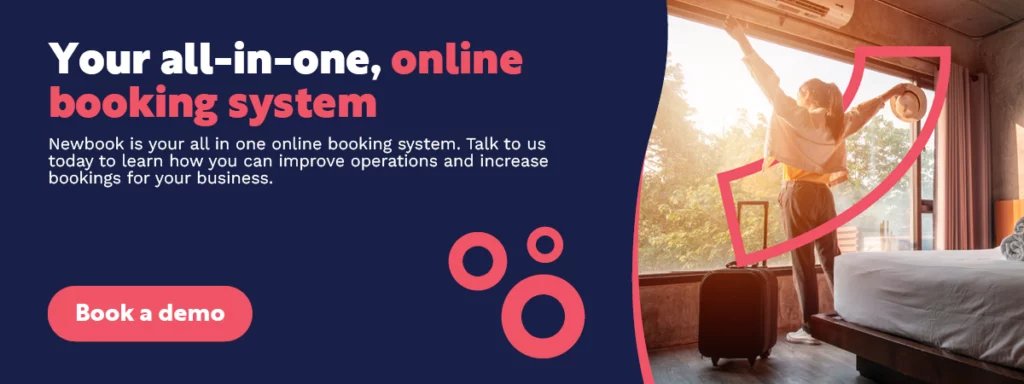
2 Data Analytics and Artificial Intelligence
The proof is in the pudding…actually, in this case, it’s data. Don’t fall into the trap of completely trusting your personal feelings when it comes to determining guest behavior because when you look at the cold, hard data, you might be surprised!
Advanced analytics and AI technologies help hotels analyze large volumes of data to identify patterns, trends, and predictive insights related to guest behavior and preferences. By leveraging AI-driven recommendation engines and predictive analytics, hotels can anticipate guest needs and preferences, proactively suggesting relevant upselling and cross-selling opportunities tailored to individual guests.
Hotel Upselling and Cross-Selling Techniques to Implement Into Your RMS

Implementing effective upselling and cross-selling techniques into your Revenue Management System (RMS) can significantly boost your hotel’s revenue and enhance the guest experience. Here are some strategies you can consider:
- Personalized recommendations: Utilize guest data and preferences stored in your RMS to offer personalized upsell and cross-sell recommendations. Tailoring offers to match guest preferences increases the likelihood of conversion.
- Bundle packages: Create bundled packages that combine room upgrades with additional services or amenities such as spa treatments, dining credits, or local experiences. Bundling offers can provide added value to guests while increasing overall spend.
- Timely communication: Use automated messaging through your RMS to send targeted upsell and cross-sell offers at strategic points in the guest journey, such as pre-arrival or during the booking process. Timely communication increases the likelihood of conversion while enhancing the guest experience.
- Visual presentations: Incorporate visually appealing presentations of upsell and cross-sell options within your booking engine or guest communication channels. High-quality images and descriptions help to showcase the value of additional offerings and entice guests to upgrade.
- Incentivize staff: Train your front desk and reservation staff to effectively upsell and cross-sell by providing incentives such as commissions or bonuses for successful conversions. Motivated staff are more likely to actively promote additional services to guests.
- Upsell during check-in: Train your front desk staff to upsell room upgrades or additional services during the check-in process, based on availability and guest preferences. This provides an opportunity to capture last-minute upgrades and enhance the guest experience from the outset.
- Post-stay follow-up: Send post-stay follow-up communications through your RMS to thank guests for their stay and offer incentives or discounts on future bookings, including upsell options for their next visit. This encourages repeat business while maintaining guest engagement.
- Monitor performance: Continuously monitor the performance of your upsell and cross-sell initiatives within your RMS, analyzing conversion rates, revenue generated, and guest feedback. Use this data to refine your strategies and optimize future offerings.
- SMS automation: Sending automated messages to the right guests at the right time can help you deliver a better guest experience and increase your revenue. Offer tailored promotions, get useful feedback via surveys, and promote different upsells like late checkouts to offer your guests more options and boost your income per guest.
- Experiment and adapt: Be willing to experiment with different upselling and cross-selling techniques within your RMS and adapt your approach based on guest feedback and market trends. Continuously innovating and refining your strategies will help maximize revenue potential over time.
Newbook’s Hotel Upsell Software
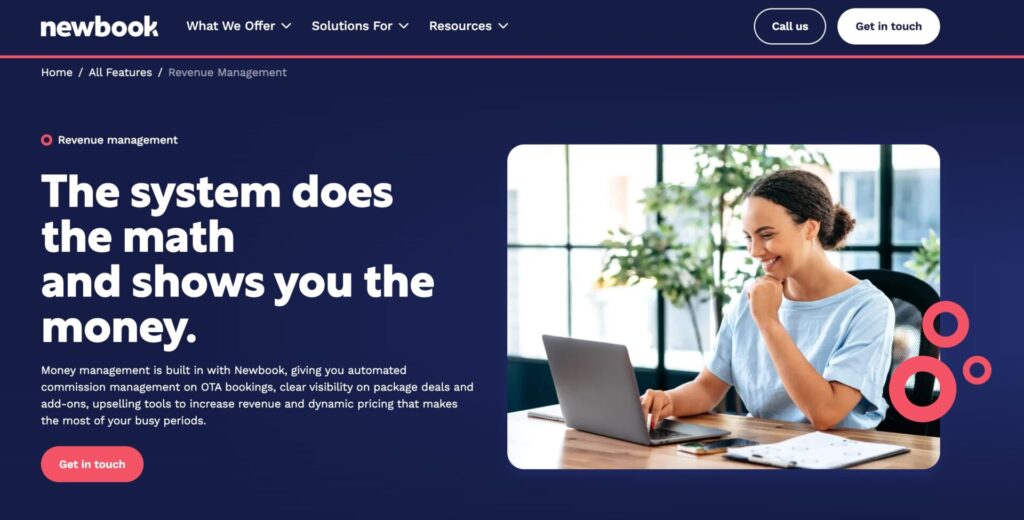
Harness the power of online booking systems to elevate your business’s visibility and broaden its audience reach significantly. Embracing reservations through your website, combined with strategic utilization of Online Travel Agencies (OTAs), serves as a cornerstone strategy for amplifying bookings and bolstering revenue.
Newbook’s online booking engine offers essential booking features designed to streamline your reservation process into a user-friendly, step-by-step system. By harnessing Newbook, your guests will likely want to book directly with you instead of settling for an OTA.
Newbook’s online room booking system not only delivers exceptional functionality but seamlessly integrates it within a comprehensive PMS and Revenue Management System (RMS). This integration empowers you with invaluable insights derived from booking data, enabling informed decision-making. Picture leveraging an in-depth understanding of your customer base to refine marketing initiatives. By scrutinizing data on preferred room types and popular add-ons during the booking phase, you can tailor marketing campaigns for optimal effectiveness.
Newbook’s software boasts exceptional reliability and speed, setting it apart from competitors. While some room booking software providers guarantee 99% uptime, Newbook surpasses expectations with an impressive 99.99% uptime rate.
To illustrate, consider the potential outage times outlined below:
| Reliability Rating | Potential Outage Time |
|---|---|
| 99% | 3 days, 15 hours, and 39 minutes annually |
| 99.99% | 52 minutes and 35 seconds annually |
The small difference of 0.99% holds significant weight in terms of reliability. Choosing Newbook ensures minimal downtime, with less than an hour of potential disruption annually, establishing it as the premier choice for businesses in search of dependable and efficient room booking solutions.
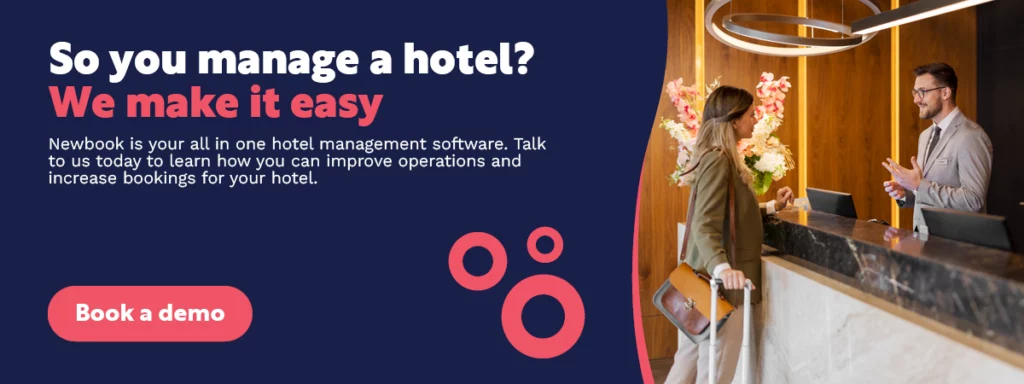
Final Thoughts on Cross-Selling vs Upselling

Understanding the distinctions between cross-selling and upselling in the hospitality industry is pivotal for optimizing revenue streams and enhancing the guest experience. By integrating these strategies into your booking process and Revenue Management System (RMS), hotels can capitalize on opportunities to drive incremental sales and deliver personalized value to guests.
Key takeaways include:
- Upselling: Encouraging guests to upgrade their choices or add premium features to their existing bookings, such as room upgrades, enhanced amenities, or special packages.
- Cross-selling: Recommending related or complementary products or services based on guests’ current purchases or interests, such as restaurant reservations, spa treatments, or tour bookings.
The benefits of cross-selling vs upselling in hotels are manifold, including increased revenue, enhanced guest experience, personalization, optimized inventory utilization, increased guest engagement, and competitive advantage.
Effective implementation of these strategies requires leveraging technology, such as channel managers, robust online booking engines, data analytics, and artificial intelligence. Additionally, adopting personalized communication techniques, incentivizing staff, and monitoring performance are essential for maximizing the success of upselling and cross-selling initiatives.
Newbook’s hotel upsell software exemplifies these principles, offering essential booking features, seamless integration with PMS and RMS, exceptional reliability, and superior uptime rates. By choosing Newbook, hotels can ensure minimal downtime and establish themselves as leaders in providing dependable and efficient room booking solutions.
In essence, embracing cross-selling vs upselling techniques tailored to guest preferences and market dynamics empowers hotels to unlock new revenue streams, foster guest loyalty, and elevate the overall guest experience, ultimately driving long-term success in the hospitality industry.
Reach out to us today to get a demo of Newbook, or have your questions answered by a sales representative, and discover how Newbook can boost your revenue.
